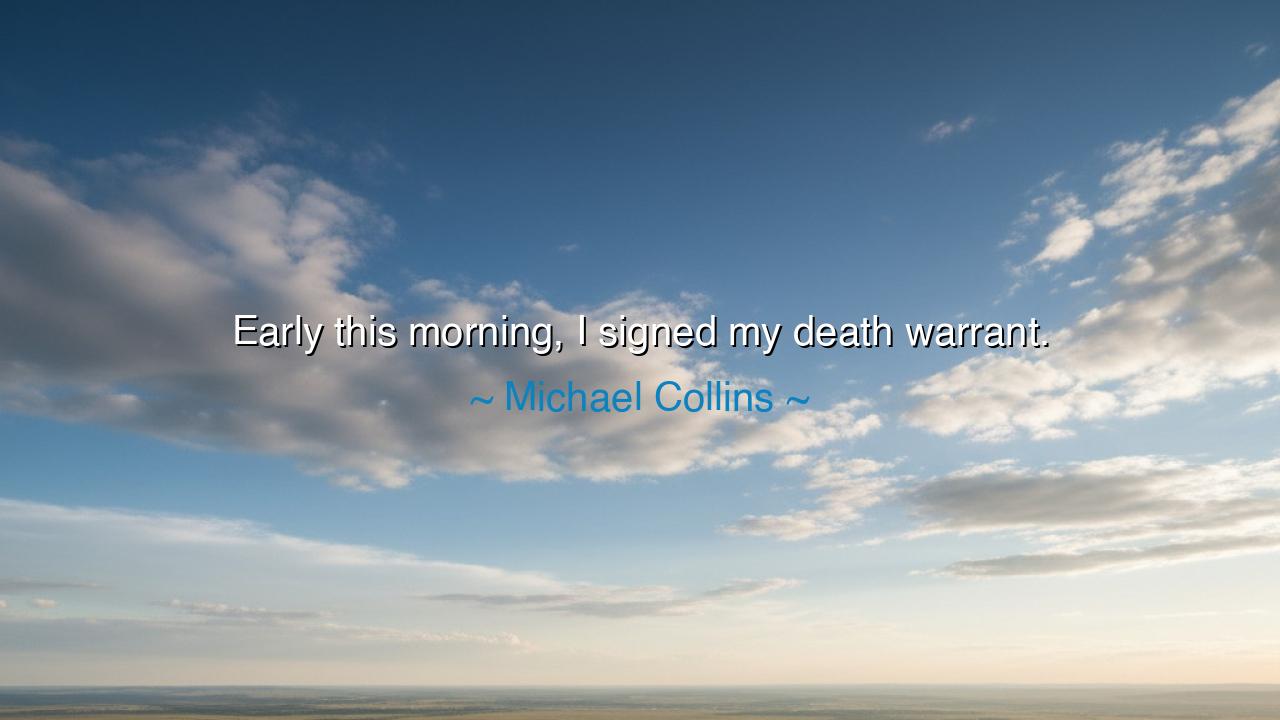
Early this morning, I signed my death warrant.






The words of Michael Collins — “Early this morning, I signed my death warrant.” — are among the most haunting ever spoken by a man of courage and conviction. They belong not to one who sought death, but to one who loved his country more than his own life. In this single sentence lies the eternal burden of the patriot, who must sometimes choose between the peace of his soul and the salvation of his people. Collins uttered these words after signing the Anglo-Irish Treaty in December 1921, an agreement that granted Ireland limited independence from Britain after centuries of struggle. He knew, as he set his pen to paper, that his decision — though born of hope — would divide his nation and likely lead to his own death. Yet he signed it anyway.
To understand the full weight of this statement, one must see the man behind it. Michael Collins, commander of the Irish Republican Army and a founding architect of Ireland’s independence, was no ordinary politician or soldier. He was both warrior and visionary — a man who fought in the shadows and negotiated in the open. For years, he led the Irish fight against British rule with unmatched intelligence and audacity. Yet when peace finally seemed within reach, it came at a cost: the treaty he helped broker left Northern Ireland under British control and required Irish leaders to swear allegiance to the British Crown. To some, it was a betrayal; to Collins, it was a stepping stone to freedom, the first breath of a nation long suffocated. He foresaw that signing it would make him a target of his own brothers-in-arms, but he believed that progress demanded sacrifice — even his own life.
In these words — “I signed my death warrant” — we hear the voice of a man torn between duty and destiny. He did not speak them with bitterness, but with the calm acceptance of one who understood that every great act of creation requires a crucifixion of the self. The ancients would have seen in Collins a figure like Prometheus, who stole fire from the gods to bring light to humankind, knowing he would be punished for his gift. Or like Socrates, who drank the hemlock not in despair, but in fidelity to truth. So too did Collins recognize that leadership is not measured by popularity or comfort, but by the willingness to bear the cost of vision. The good leader does not live for approval; he lives — and if need be, dies — for the greater good.
History would soon prove his prophecy true. Less than a year after the signing, Ireland descended into civil war — a tragic conflict between those who supported the treaty and those who opposed it. In August 1922, Collins was ambushed and killed at Béal na Bláth, in his own homeland, by Irishmen who once had fought beside him. He was just thirty-one years old. Yet his death did not diminish his legacy — it enshrined it. For even in death, he became a symbol of what it means to serve something greater than oneself. His words, spoken in weary foresight, became immortal: a reminder that the path to freedom is often paved with the blood of those brave enough to walk it first.
But beyond its political meaning, Collins’s quote speaks to the universal truth of sacrifice. Every person who dares to follow their conscience will one day face a moment like his — a moment when doing what is right means losing something dear: safety, acceptance, or even life itself. The parent who works two jobs to give their children a future, the whistleblower who risks reputation for justice, the soldier who stands in defense of the innocent — all, in their own way, “sign their death warrant” when they choose principle over comfort. The courage of Collins is not only for heroes of history; it is a fire meant to live in every human heart that refuses to bow before fear.
The ancients taught that the noblest death is not in vain defiance, but in purposeful sacrifice. In this sense, Collins’s act mirrors the timeless wisdom of those who have understood that life without honor is a lesser death. When a person stands for truth — whether on the battlefield, in the courtroom, or in the quiet corners of conscience — they affirm something eternal: that the soul’s dignity is greater than the body’s survival. Such people remind us that death, when embraced in service of truth or freedom, ceases to be an end; it becomes a beginning, a torch passed to future generations.
The lesson of Michael Collins’s words is clear and radiant: true leadership demands courage beyond the self. It requires a willingness to be misunderstood, to be hated, and even to perish, if doing so preserves the greater dream. In our own lives, we may not be called to die for our beliefs, but we are all called to live for them — to act despite fear, to choose the harder path when conscience commands it.
So remember these words when the world tests your resolve: “Early this morning, I signed my death warrant.” They are not a lament, but a declaration — that some choices, though fatal to the body, give life to the soul of a nation, a cause, or a truth. Walk bravely in your convictions. Know that fear will whisper its counsel, but purpose must answer louder. For in the end, it is not how long one lives that defines greatness, but how faithfully one serves the light, even when it costs everything.






AAdministratorAdministrator
Welcome, honored guests. Please leave a comment, we will respond soon